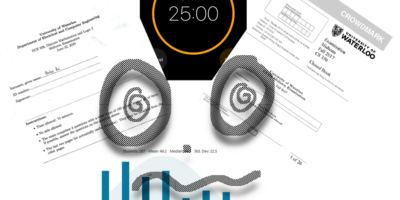Exams are a great way to bond with your peers and friends. Studying together all day, struggling to understand a particularly tricky concept, and then rounding it out with the comradery that comes of complaining about the stupidity of it all. While exams, with their propensity to cause a large amount of stress and their large hold on one’s academic success, are easy targets for complaint, the complaint is not all that well deserved; exams are extremely useful for evaluating students understanding, especially in programs like engineering that are largely academic as opposed to hands-on. They give each student the opportunity to succeed until the end of term. They are useful at pinpointing the independent knowledge of each student, and do so in a way that is relevant to the skills engineers as professionals need. Furthermore, while exams can promote poor study habits, it is not the exam itself that causes the habits but poor study skills.
The first great advantage of exams (particularly finals) is that they keep all of the marks up in the air until the end of the term. No matter how poorly someone does throughout the year, how much trouble they had with the concepts, their academic fate is not sealed until the final is over. There is never a need to give up hope on a course half way through because hard work, and soliciting help from the professor or TAs can give you a passing grade.
The criticism of this fact is that all of the hard work you’ve done all term is irrelevant, and that it all comes down to one day. This is not the true. For instance, weekly assignments, lab reports, and projects still provide important marks; good marks in these areas can bolster a poor examination, and relying on exams alone can give you a pass, but not a terrific mark. A student who was confident in the material throughout the term is rewarded by the project marks, and should still do well on the final since she knows the content. But for the student who had other difficulties over the term, the high-weight final is a merciful second chance.
Exams are very useful for a second purpose: they pinpoint the knowledge and understanding of the student themselves. What is being tested by an exam is not google-fu, the ability of the student to collaborate with potentially more-knowledgeable partners, or the ability to figure something out over the course of days. What is being tested is the understanding the student has of the material. Does he know how to approach a problem? Does he have a grasp of the key concepts? Particularly on math-heavy exams, the final answer is rarely worth many marks while being able to apply a methodology that is correct is very important. What exams seek out—the knowledge that the student has—is a critical evaluation metric that projects and assignments do not provide.
This leads in to the final reason that exams are important: for engineering students in particular, they test the incredibly-relevant skill of having a competent grasp of the field one is supposed to be an expert in. When an engineering student graduates, they are well on their way to being a professional in a career field where the good of the public—and potentially the well-being of individual people—is at sake. When an engineer signs off on a design, she is saying that she is confident in that design. Designs that could cause risks take a long time to make, and they are rigorously checked-over. However, she cannot check for something that she did not know was a concern.
For instance, if someone took a materials course and got through corrosion by copying a friend, he won’t know how different metals touching cause expedite corrosion. It’s not as simple as looking in the textbook, because without the fundamental knowledge of how corrosion works, it might not occur to him to check. The exam tests if the student can think about corrosion and really understand how it behaves, so in the future the student can identify times when he should consider the effects of corrosion. Exams, by testing the understanding that the student has of concepts, prove the ability of the student to apply the knowledge they are alleged to posses. This skill is not proven using alternative evaluation techniques alone.
Another criticism of exams is that they promote cramming and don’t really teach the material. Indeed, it invalidates the previous point if one can learn all the content overnight, repeat it the next day, and then forget it. However, it is not as simple as that; it is absolutely possible to employ poor study habits that do not impart the benefits of exams to the exam taker. This is where one’s own professionalism comes in. School is a full-time job, with way more than 40 hours per week. Like any job, its not good enough to just show up; there needs to be professional development. Learn time management strategies that keep from being overwhelmed. Learn new studying skills that allow one to excel on exams and retain the information. Then the exam really does prove that one is competent with the ideas the class has taught. This is not a problem unique to exams: copying and hanging off groupmates coattails are just as effective at devaluing assignments and group projects respectively.
Exams are an incredibly useful evaluation technique, used in most courses in this school for good reason. They give everyone the opportunity to succeed without punishing those that work consistently throughout the term. The skill that they test, personal understanding of the subject, is an important skill particularly for a professional program like engineering. While it is possible to “cheat” this purpose by cramming the night before, similar problems affect the alternative evaluation methods. As with these other methods, it is up to the student to ensure that they participate in the evaluation process appropriately.




Leave a Reply